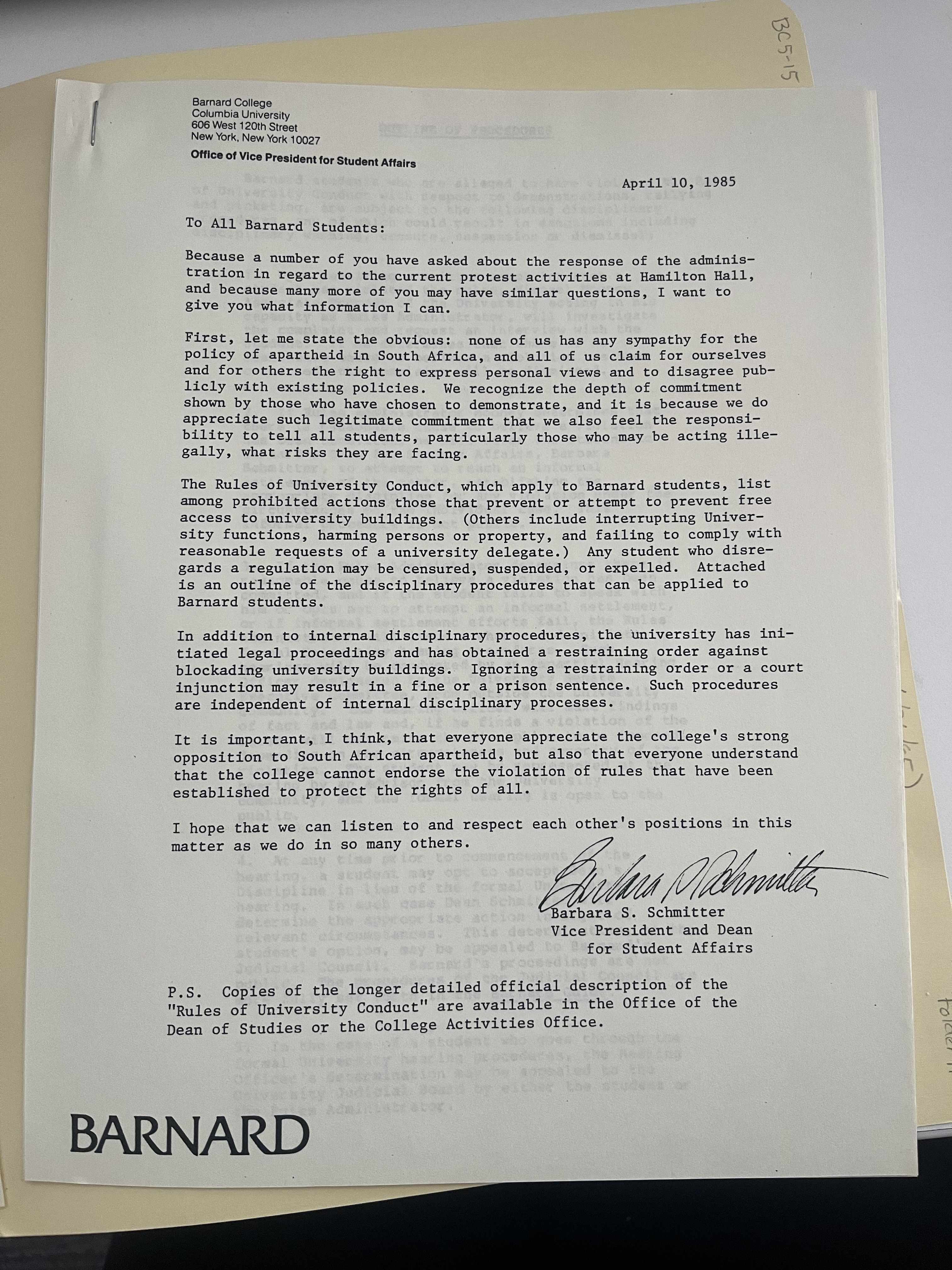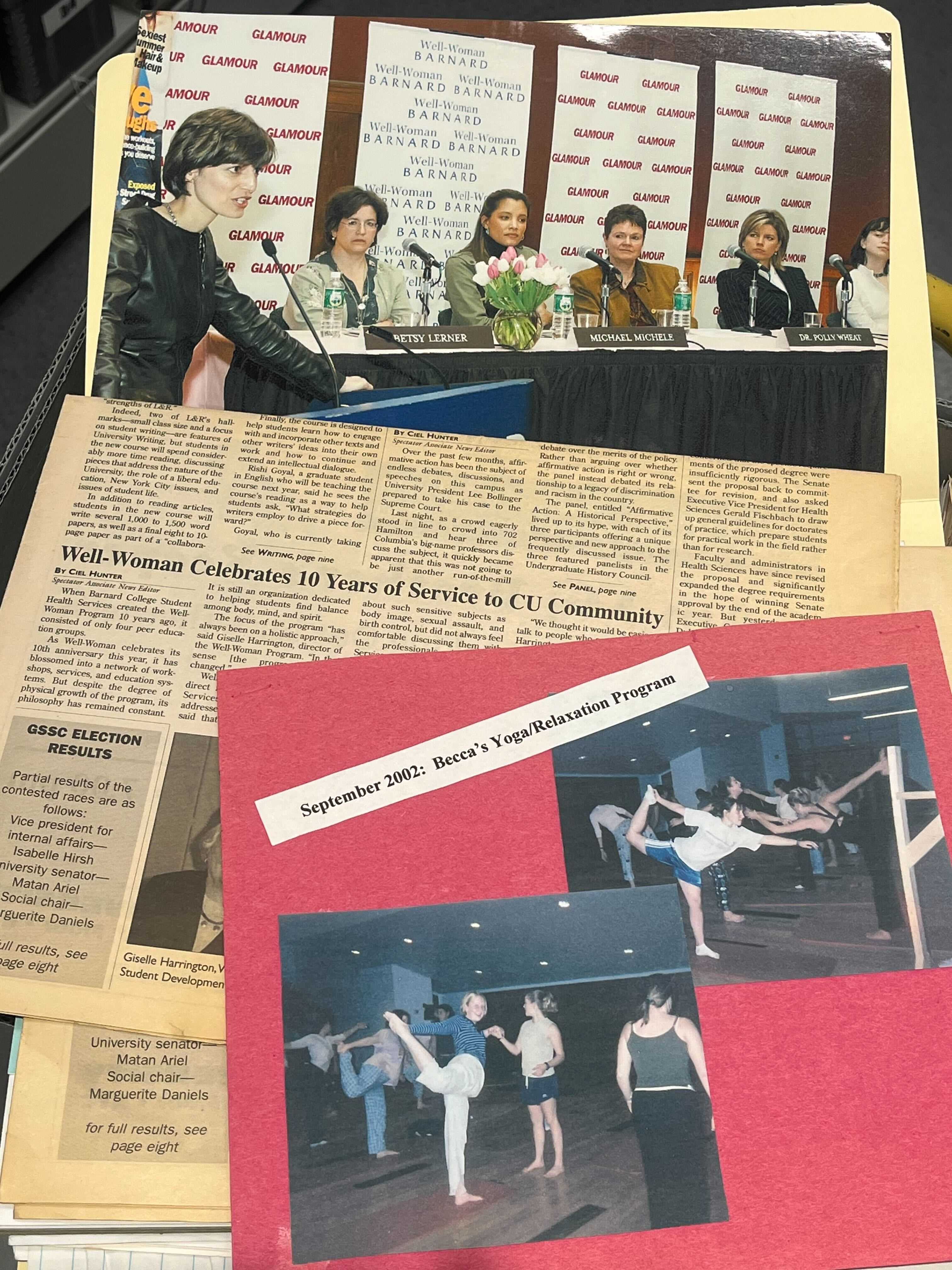Maia Hirschler and Katelyn Landry, the 2024-25 Archives Graduate Fellows, are focusing on making college records more accessible to help researchers understand more about the history of the College’s governance, policies, student support, diversity and inclusion efforts, health services, and labor relations. Concurrent with this work, Records Coordination and Processing Archivist Olivia Newsome is re-processing and adding new materials to the records of the President’s Office, elucidating the College’s leadership since 1952 (when the office of the Dean, previously Barnard’s chief administrator, was renamed to President). We welcome students, staff, faculty, and external researchers to make use of these rich and varied collections!
Newly processed collections with significant additions include:
Deans’ Office for Advising & Support Records (BC05-15)
The records of the Deans’ Office for Advising & Support (DOAS), formerly known as the Office of the Dean of Studies, contain over 50 years of administrative correspondence, memoranda, projects, and reports that reflect administrative policies, strategies, and structures for providing academic advising to Barnard students. These materials were generated by the Dean for Academic Advising and Support, formerly known as the Dean of Studies, as well as Class Deans, faculty committees, and other administrators to manage course registration, major/minor advising, grading policies, curriculum changes, study abroad, and other matters related to a student’s course of study.
While the Dean of Studies position was primarily concerned with academics, Dr. Barbara Schmitter – who served as Dean of Studies from 1966-82 and Vice President and Dean of Student Affairs from 1982-93 – often weighed in on non-academic issues such as coeducation and diversity, student housing, student protests, financial aid, substance use on campus, and other matters related to student life more broadly. Her correspondence, which is contained in Subseries 1.1, is a useful tool for researching the ways in which the responsibilities and oversight of the Dean of Studies often overlapped with those of other administrators and changed depending on the needs and demands of the Barnard community. Some items of interest from the Schmitter correspondence include administrative responses to student protests against South African apartheid, student grievances related to unfair campus housing procedures, and administrative responses to racism, discrimination, and lack of diversity on campus.
Series 3 of the collection contains audio cassette and videotape recordings of interviews with Black, Latine, Muslim, and Asian Barnard students and alumni in the 1990s and early 2000s. The interviews were conducted for a series of promotional and educational videos that were intended to “educate students, faculty, and staff about the experiences of students of color” (Barnard Magazine, Spring 2005). This series includes both the full uncut interviews as well as the final videos that were produced: "About Face," which highlights Asian students’ experiences; "Indivisible," which highlights Black students’ experiences; and "Óyeme (Hear Me)," which highlights Latine students’ experiences. Interviews were conducted with Muslim students; however, a final video was never produced.
Archives staff are in the process of digitizing the interviews and hope to make them available to researchers in coming months. These interviews will be of particular interest to researchers interested in administrative diversity initiatives and the experiences and perspectives of students of color at the turn of the 21st century.
During the fall of 2022, the Barnard Resident Assistants Union began the process of unionizing. The materials in this collection attest to the union’s negotiations with the College. This collection includes photographs of rallies, flyers, petitions, summaries of bargaining sessions, and draft contracts.
This collection also testifies to the confrontational relationship between the Barnard Administration and its students, and to the ways in which different student movements overlap with and reinforce one another, as is the case with Barnard RA Union and the student campus protests against the genocide in Gaza in the spring of 2024.
Office of General Counsel Records
The records of the Office of General Counsel (OGC) contain correspondence, memos, notes, policies, strike contingency plans, opinions of counsel, agreements,mortgages, and research files.The General Counsel is the chief legal officer of the College, serves as legal counsel to the President and Board of Trustees, and reports directly to the President of the College. The materials attest to the many functions of OGC, including dealing with tenant complaints, managing real estate and mortgages, negotiating with labor unions representing Barnard employees, including the newly formed Barnard RA Union, and addressing policy issues, including the admission of transgender students at Barnard and political expression on campus.
The materials cover key moments of tension between the College and the surrounding community, including tenant harassment complaints in the 1970s, as well as conflicts between the College and its employees, which includes negotiations with the Barnard clerical workers’ union (District 65/UAW 2110) and the College’s preparation for and responses to the union’s strikes, which were supported by College students.There is significant correspondence with union representatives from UAW 2110/District 65 as the union tried to negotiate contracts with the College, including materials about the 1996 strike, which was one of the longest strikes in a university or college setting. These materials will be of interest to users who want to delve into labor relations and institutional policy-making. These records complement the Campus Labor Unions and Labor Union Campaigns records, adding to the narrative of labor relations at Barnard.
Health and Wellness Services Records (BC05-21)
The records of the Health and Wellness Services Office include informational guides, posters, flyers, correspondence, research reports, meeting minutes, and notes created by Barnard staff and peer educators during the planning, advertisement, and execution of health education programs and events for students. The collection illustrates roughly 60 years of Barnard students’ engagement with a wide range of topics including sexual health and violence, alcohol and substance abuse, eating disorders, body image, counseling and psychiatry, public health, suicide awareness and prevention, and other issues related to health and wellbeing. The collection reflects the ways in which Health and Wellness Services increased and diversified its services and programs as the Barnard community’s notions of health and wellness expanded and changed. Researchers who are particularly interested in institutional responses to public health, stress management, and sexual health and violence among college students may find the collection helpful.
The bulk of the collection comprises records generated by the Wellness Spot (formerly known as Well-Woman) while they developed health education programming and provided support services since its establishment in 1993 through 2012. The Wellness Spot materials include meeting minutes, peer education training guides, event flyers, informational pamphlets, visitor logs and event attendance records, programming plans, secondary published sources, and email correspondence between peer educators and Health and Wellness staff. The Wellness Spot materials will be of interest to researchers interested in student labor, particularly the role of peer educators in disseminating information and ideas about health and wellness on campus.
Please contact archives@barnard.edu to set up an appointment to access collections in person or request materials remotely.

